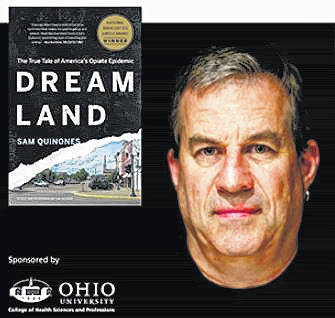
There is not a solution to the opioid problem, said author Sam Quinones in Athens, Ohio Wednesday, but many solutions.
The West Coast reporter who studied the spread of black tar heroin into Appalachia spent three days in Athens this week discussing the opioid problem and his book about it, “Dreamland.”
Quinones was scheduled earlier this year to speak at an event in Circleville but that event was cancelled for health reasons related to the author, according to event organizers familiar with the plans.
Wednesday’s lecture was part of a three-day, “Standing Together: Fighting Our Community’s Opioid Epidemic” forum at Ohio University.
Quinones’ book, “Dreamland: The True Tale of America’s Opioid Epidemic,” chronicles the pervasive rise of opioid addiction in small town Appalachia.
As a reporter, Quinones was “shocked” at the first report of black tar heroin turning up in Huntington, W.Va., and it prompted him to look deeper into the heroin issue, he said Wednesday. The book weaves together a powerful narrative of the influence of doctors who ran private pill mills stocked by powerful pharmaceutical companies and the Mexican villagers who were quick to step in with black tar heroin when strict regulations were placed on pills. The pills came first, said Quinones, and that demand was easily filled by drug cartels who developed an unsparing marketing and trafficking network to push more heroin into the hands of Americans, including to those who didn’t use pills. The result has been devastating, with more than 90 Americans dying each day from a drug overdose.
When asked about solutions and what he sees in communities that is working, Quinones said rural people have to consider two things.
First, he said, some communities were fed a narrative that has put many rural regions on their backs economically by leading counties to believe they aren’t economically viable enough to grow their own economies. Quinones said that unfortunately, some counties have believed this narrative. Each city must come together to rebuke that narrative and strengthen the local economy through cooperation of village councils and city managers.
Secondly, Quinones said counties have to build stronger partnerships among agencies that currently don’t talk to one another. Sports and athletic trainers, teachers, clergy, and county agencies need to start talking and working together.
Another solution Quinones talked about were the law enforcement agencies in Kentucky that are now working together to convert jails into rehab centers, a solution that he said people need to take into consideration in other areas that are not finding success in arresting their way out of the heroin problem.
“There isn’t a solution to the opioid epidemic,” said Quinones. “There are many solutions.”
Isolation has contributed to the worsening of the opioid problem, said Quinones. He said people need to utilize their parks more, go outside often, interact with neighbors, and come together in their communities.
He said he has seen communities come together with the understanding that isolation is how the heroin problem happened and take the lead on making changes. Isolation is not just what happens within neighborhoods, said Quinones, but also occurs when sports and athletic trainers, teachers, clergy, and county agencies don’t talk to each other.
Quinones said growing partnerships and communication among agencies will bring change to the opioid problem and restore communities.
“Isolation happens in a number of forms,” said Quinones. “The only way to combat it is to bring as many parts of the community together as possible to combat it. But we haven’t done that. The agencies don’t know what each other is doing. It’s my hunch, very strong hunch, that it’s that kind of isolation that is bringing this problem county by county. We’re not used to working together. We’re in our own little offices and budgets.”
Quinones warned that isolation for people in treatment will not help either.
“The isolation in mental health and treatment doesn’t help the problem, it actually makes it worse,” said Quinones. “I think we need to let it change us…the counterproductive, harmful isolation. It is time to reassess and muster forces together to make a difference.”


